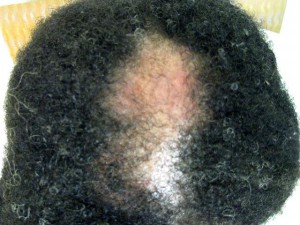Central Centrifugal Cicatricial Alopecia (CCCA) is a common cause of hair loss in black women. CCCA video from last weekend’s shoot by SOCS members coming next month (from left to right): Laura Uwakwe, MD – Dermatology Research Fellow, Wake Forest Dept. of Dermatology, Lynn McKinley-Grant, MD – Dermatologist, Duke University, Amy McMichael, MD – Dermatologist, Wake Forest Dept. of Dermatology, and Kayla Felix, MS – Medical Student, Wake Forest School of Medicine.
Blog
Central Centrifugal Cicatricial Alopecia (CCCA)
July 5, 2018Share This:

Central Centrifugal Cicatricial Alopecia (CCCA)
March 13, 2015Share This:
Central Centrifugal Cicatricial Alopecia (CCCA)
Candrice R. Heath, MD, Caroline N. Robinson, BS and Roopal V. Kundu, MD
 Central centrifugal cicatricial alopecia (CCCA) is a very common cause of alopecia or hair loss in black women. Hair loss from CCCA occurs primarily in the central (crown) part of the scalp. The hair loss radiates outward in a centrifugal or circular pattern and is usually gradual although some people experience a rapid progression of the hair loss. CCCA causes destruction of the hair follicles and scarring leading to permanent hair loss. CCCA is the most common type of cicatricial (scarring) alopecia.1
Central centrifugal cicatricial alopecia (CCCA) is a very common cause of alopecia or hair loss in black women. Hair loss from CCCA occurs primarily in the central (crown) part of the scalp. The hair loss radiates outward in a centrifugal or circular pattern and is usually gradual although some people experience a rapid progression of the hair loss. CCCA causes destruction of the hair follicles and scarring leading to permanent hair loss. CCCA is the most common type of cicatricial (scarring) alopecia.1
What is the cause of CCCA?
The exact cause of CCCA is unknown. Though previously thought to be solely related to the use of hot combs, excessive heat and hot oils on the scalp, chemical relaxers, and excessive tension from braids, tight hair rollers, weaves or extensions, the current thought also points to heredity (family history) playing a role.1-2 When scalp samples (biopsies) from people affected by CCCA are examined under a microscope, inflammation and scarring is typically present around the hair follicles.1-2
How do I know if I have CCCA?
Symptoms of CCCA can vary and may include itching, burning, tingling, pain or no symptoms at all. Dermatologists typically suspect this condition by examining your scalp, but many will take a small sample from the scalp (a biopsy) and send it to the lab for evaluation and confirmation of the diagnosis.
What treatments are available for CCCA?
It is best to treat CCCA early before permanent hair loss develops. As the disease progresses, hair follicles may scar beyond the point of repair. The mainstay of treatment is anti-inflammatory medications. Topical, oral, or injected corticosteroids, oral antibiotics, and other anti-inflammatory agents may help reduce inflammation and prevent hair loss in African American women. 1-2 Minoxidil may also be used to help stimulate hair growth from follicles that are not scarred. Gentle hair grooming practices such as natural (chemical and heat-free) hair styles, reduced frequency of relaxers, and limited styling products, are also recommended in order to prevent inflammation and concomitant hair breakage.2 Hair transplantation may be considered in patients with permanent hair loss in whom scalp inflammation is absent or well controlled.2 Studies are needed to help better define this disorder and effective treatments.
Download Spanish translation.
Descarga traducción en español.
Additional Resources
Cicatricial Alopecia Research Foundation, www.carfintl.org
References
1. Quinn, CR. Alopecia. In: Kelly AP, Taylor SC, editors. Dermatology for Skin of
Color. New York: McGraw Hill Medical; 2009. p.227‐239.
2. Callendar VD and Young CM. Alopecias and hair restoration in women. In:
Aesthetics and Cosmetic Surgery for Darker Skin Types. Philadelphia:
Lippincott Williams and Wilkins; 2008. P. 287‐295.
Education Video Library




